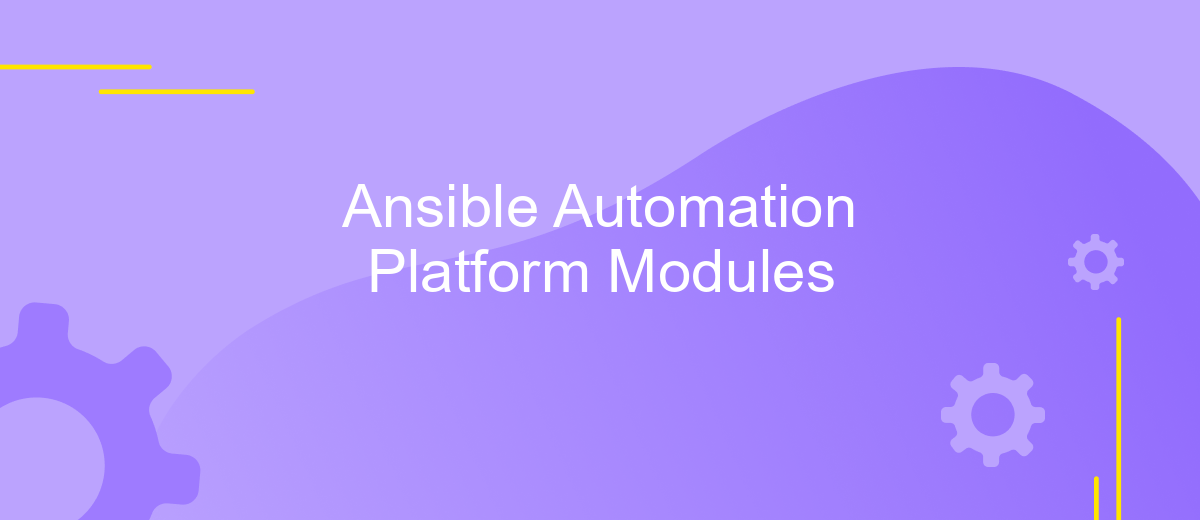Ansible Automation Platform Modules
The Ansible Automation Platform Modules are essential components for streamlining and enhancing IT operations through automation. These modules provide a comprehensive suite of tools designed to simplify complex tasks, improve efficiency, and ensure consistency across various environments. By leveraging these modules, organizations can automate routine processes, reduce human error, and focus on strategic initiatives, ultimately driving innovation and operational excellence in today's fast-paced digital landscape.
Introduction
Ansible Automation Platform Modules are integral components of the Ansible ecosystem, providing users with the tools needed to automate complex IT tasks efficiently. These modules simplify automation by offering pre-built scripts that perform specific tasks, ranging from managing cloud services to configuring network devices. By leveraging these modules, IT professionals can streamline their workflows, reduce manual effort, and enhance operational consistency across their infrastructure.
- Pre-built automation scripts for diverse IT tasks
- Support for cloud services and network device management
- Streamlined workflows and reduced manual effort
- Enhanced operational consistency and reliability
Designed to be both powerful and flexible, Ansible Automation Platform Modules cater to a wide range of use cases, enabling users to customize and extend their automation capabilities. Whether managing a small network or a large-scale cloud environment, these modules provide the necessary functionality to achieve seamless integration and deployment. As organizations continue to embrace automation, Ansible modules will remain a vital resource for driving efficiency and innovation in IT operations.
Ansible Modules

Ansible modules are the building blocks of Ansible playbooks, providing a means to automate tasks across a wide range of systems. These modules are essentially small programs, each designed to perform a specific task such as managing files, installing packages, or configuring services. With over 450 modules available, Ansible offers a versatile toolkit for system administrators to manage infrastructure efficiently. Each module can be executed independently or as part of a playbook, allowing for both ad-hoc task execution and complex automation workflows.
In addition to the standard modules, Ansible supports custom modules, enabling users to extend its functionality to suit specific needs. This flexibility is particularly useful when integrating with third-party services or APIs. For instance, using a service like ApiX-Drive, users can streamline integrations between Ansible and various applications, facilitating seamless data exchange and process automation. By leveraging such integrations, organizations can enhance their automation capabilities, reduce manual errors, and improve operational efficiency. Whether managing cloud infrastructure or deploying applications, Ansible modules provide the necessary tools to automate and optimize IT operations.
Benefits of Using Ansible Modules

Ansible Modules are integral components of the Ansible Automation Platform, offering a streamlined approach to managing and automating IT environments. These modules simplify complex tasks, allowing users to focus on higher-level strategies rather than intricate coding details. By leveraging Ansible Modules, organizations can enhance efficiency, reduce human error, and achieve consistent results across various systems.
- Consistency: Ansible Modules ensure uniformity in task execution, minimizing discrepancies and errors.
- Scalability: They facilitate the management of large-scale environments, enabling seamless scaling of operations.
- Flexibility: With a wide range of modules available, users can tailor solutions to meet specific needs and integrate with diverse systems.
- Time-saving: Automation of repetitive tasks saves time, allowing IT teams to focus on strategic initiatives.
- Community Support: A vast community contributes to the development and improvement of modules, ensuring they are up-to-date and reliable.
Incorporating Ansible Modules into your automation strategy can significantly enhance operational efficiency and reliability. Their ability to standardize processes and adapt to various environments makes them a valuable asset in modern IT infrastructure management. By utilizing these modules, businesses can achieve greater agility and responsiveness in their operations.
Ansible Modules in Practice

Ansible modules are the building blocks of Ansible's automation capabilities, allowing users to execute complex tasks with ease. These modules are essentially small programs that perform specific actions on target systems, such as installing packages, managing files, or configuring services. By leveraging Ansible modules, users can automate repetitive tasks and ensure consistency across their infrastructure.
When working with Ansible, understanding how to effectively use modules is crucial. Modules can be executed individually via ad-hoc commands or integrated into playbooks for more comprehensive automation workflows. Each module is designed to be idempotent, meaning it can be safely run multiple times without causing unintended changes, ensuring predictable results.
- Install and manage software packages with the
yumoraptmodules. - Manage files and directories using the
copy,template, andfilemodules. - Configure and manage services with the
serviceandsystemdmodules. - Automate cloud resource management using modules for AWS, Azure, and Google Cloud.
By mastering Ansible modules, IT professionals can streamline their operations, reduce manual intervention, and enhance their infrastructure's reliability. Whether managing a small server cluster or a large-scale cloud environment, Ansible modules provide the flexibility and power needed to automate tasks efficiently.


Conclusion
In conclusion, Ansible Automation Platform Modules serve as a vital component in streamlining IT operations, providing a robust framework for automating complex tasks across diverse environments. These modules empower teams to enhance efficiency by reducing manual intervention and minimizing human error, ultimately leading to more consistent and reliable outcomes. By leveraging the power of Ansible, organizations can seamlessly manage configurations, deployments, and integrations, thus promoting a more agile and responsive IT infrastructure.
Moreover, integrating tools like ApiX-Drive can further augment the capabilities of Ansible Automation Platform Modules. ApiX-Drive facilitates effortless integration with various applications and services, enabling seamless data flow and communication across platforms. This synergy not only simplifies the automation process but also empowers businesses to focus on innovation and strategic growth. As organizations continue to embrace digital transformation, the adoption of Ansible Automation Platform Modules, complemented by integration services like ApiX-Drive, will remain central to achieving operational excellence and maintaining a competitive edge in the ever-evolving technological landscape.
FAQ
What is Ansible Automation Platform Modules?
How do I install additional Ansible modules?
Can Ansible Automation Platform Modules be customized?
How do I troubleshoot issues with Ansible modules?
Can Ansible be integrated with other automation tools?
Apix-Drive will help optimize business processes, save you from a lot of routine tasks and unnecessary costs for automation, attracting additional specialists. Try setting up a free test connection with ApiX-Drive and see for yourself. Now you have to think about where to invest the freed time and money!

